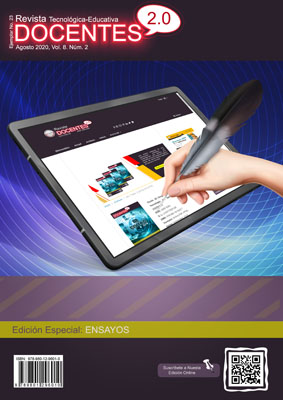Microlearning as a Technological Training Tool for University Teachers
 DOI:
https://doi.org/10.37843/rted.v8i2.172
DOI:
https://doi.org/10.37843/rted.v8i2.172
Main Article Content
Abstract
The events that characterize microlearning, are constituted in representative priorities of the dynamics that dominates the need for updating, innovation and better performance profiles within the surrounding reality of technology and super-information, in which education cannot be distanced. The present essay aimed to reflect on the need for constant training and education of the university teacher, regarding the knowledge of specific aspects related to the management of technology, related to the resources and strategies of microlearning; it was developed on the basis of sections interconnected to the mentioned tool, distinguished as microlearning: innovative pedagogy; social learning as the core of microlearning, aspects of interest of microlearning for the teacher and conclusions. Among the latter, it was identified the fact that microlearning allows university teachers to transcend in an intelligent, creative and motivating way in front of their academic activities, adjusting their activities to digital environments, where the need for self-management in educational processes is evident.
Downloads
Metrics
Article Details

This work is licensed under a Creative Commons Attribution-NonCommercial-NoDerivatives 4.0 International License.
Those authors who have publications in our journal accept the following terms:
- When a work is accepted for publication, the author retains rights of reproduction, distribution of his/her article for exploitation in all countries of the world in the format provided by our magazine and any other magnetic medium, optical, and digital.
- Authors will retain their copyright and guarantee the journal the right first to publish their work, which will be simultaneously subject to the Creative Commons Acknowledgment License (Attribution-NonCommercial-NoDerivatives 4.0 International (CC BY-NC-ND 4.0)). That allows third parties to copy and redistribute the material in any medium or format, under the following conditions: Acknowledgment - You must properly acknowledge authorship, provide a link to the license, and indicate if any changes have been made. You may do so in any reasonable way, but not in a way that suggests you have the licensor's endorsement or receive it for your use. NonCommercial - You may not use the material for a commercial purpose. NoDerivatives - If you remix, transform, or build from the material, you cannot broadcast the modified material. There are no additional restrictions - You cannot apply legal terms or technological measures that legally restrict you from doing what the license allows.
- Authors may adopt other non-exclusive license agreements to distribute the published version of the work (e.g., deposit it in an institutional archive or publish it in a monographic volume) provided that the initial publication in this journal is indicated.
- Authors are allowed and recommended to disseminate their work through the Internet (e.g., in institutional telematic archives, repositories, libraries, or their website), producing exciting exchanges and increasing the published work's citations.
- Request of withdrawal an article has to be done in writing by the author to the Editor, becoming effective after a written response from the Editor. For this purpose, the author or authors will send correspondence via e-mail: [email protected].
- The author will not receive financial compensation for the publication of his work.
- All Docentes 2.0 Journal publications are under the Open Journal System (OJS) platform at: https://ojs.docentes20.com/.
References
Alqurashi, E. (2017). Microlearning: a pedagogical approach for technology integration. Conference: International Educational Technology Conference, At Harvard, Cambridge, MA, Recuperado de: https://www.researchgate.net/publication/319715909_Microlearning_A_Pedagogical_Approach_For_Technology_Integration
Alqurashi, E. (2018). Creating a microlearning environment to facilitate retention of information: a three-step approach. Philadelphia: Temple University, 249-252.
Dolasinski, M., & Reynolds, J. (2020). Microlearning: a new learning model. Journal of Hospitality & Tourism Research, 44 (3), 551-561, https://doi.org/10.1177/1096348020901579
Giurgiu, L. (2017). Microlearning an evolving elearning trend. Scientific Bulletin, 22 (1), 18-23, DOI: 10.1515/bsaft-2017-0003
Hanshaw, G., & Hanson, J. (2019). Using microlearning and social learning to improve teachers’ instructional design skills: a mixed methods study of technology integration in teacher professional development. International Journal of Learning and Development, 9 (1), 145-173, DOI: 10.5296/ijld. v9i1.13713.
Major, A., & Calandrino, T. (2018). Beyond chunking: micro-learning secrets for effective online design. FDLA Journal, 3 (13), https://nsuworks.nova.edu/fdla-journal/vol3/iss1/13.
Mohammed, G., Nawroly, S., & Wakil, K. (2018). The effectiveness of microlearning to improve students’ learning ability. ?International Journal of Educational Research Review, 3 (3), 32-38, DOI: 10.24331/ijere.415824.
Muacevic, A., & Adler, J. (2019). Using micro-learning on mobile applications to increase knowledge retention and work performance: a review of literature. Cureus, 11 (8), doi: 10.7759/cureus.5307.
Ozge, K., Taibe, K., Ferhat Kadir, P. (2018). The effect of social network-supported microlearning on teachers' self-efficacy and teaching skills. World Journal on Educational Technology: Current Issues, 10 (2),115-129.
Tan, X. (2017). Application of micro learning resource in College English ESP Teaching. Journal of Studies in Social Sciences, 16 (2), 127-135, ISSN 2201-4624.
Trabaldo, S., Mendizábal, V., & González Rozada, M. (2017). Microlearning: experiencias reales de aprendizaje personalizado, rápido y ubicuo. IV Jornadas de TIC e Innovación en el Aula. La Plata, 2017, Disponible: http://sedici.unlp.edu.ar/handle/10915/65550






